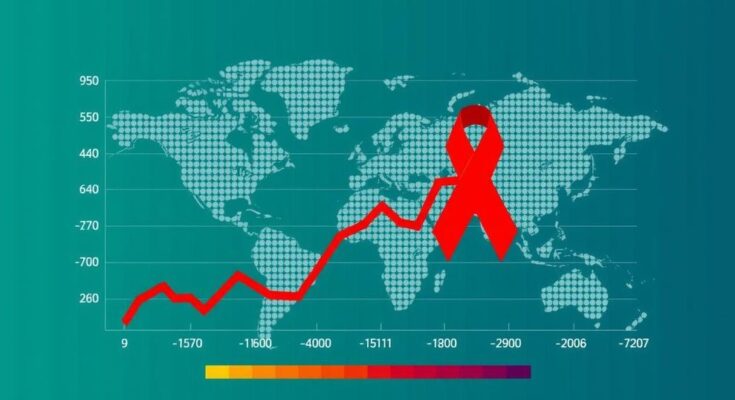UNAIDS reports that new HIV infections in 2023 reached a historic low, totaling 1.3 million cases. Despite fewer deaths from AIDS-related illnesses, significant challenges remain, particularly in treatment access and prevention efforts. Human rights issues continue to impede progress, while a promising new HIV prevention drug raises affordability concerns.
The latest UNAIDS report reveals that the number of new HIV cases recorded in 2023 is the lowest since the late 1980s, with approximately 1.3 million people newly infected. However, this figure remains over three times the target necessary to eliminate AIDS as a public health threat by 2030. The report indicated a continued decline in AIDS-related deaths, which totaled around 630,000 in 2022, down from a high of 2.1 million in 2004. Much of the success is attributed to antiretroviral treatments that effectively manage viral loads. Unfortunately, significant disparities remain, with about 9.3 million individuals worldwide still lacking access to necessary treatment, while 28 countries experienced an increase in HIV infections in the past year. Christine Stegling, UNAIDS deputy director, noted that despite advances in healthcare and activism, many countries still encounter barriers related to human rights that impede progress against the disease. The report highlights the challenges posed by discriminatory laws, such as the anti-homosexuality legislation in Uganda, which has restricted access to preventive treatments such as PrEP. Activists argue that the criminalization of same-sex relations in numerous countries further exacerbates fear and discrimination, negatively impacting healthcare outcomes. Additionally, a promising new drug named lenacapavir has been shown to effectively prevent HIV infection but poses affordability issues, particularly with the high costs set by pharmaceutical companies. Overall, while progress is being made, the report underscores the urgent need for equitable access to treatment and prevention methods to ensure a future free of AIDS-related health threats.
UNAIDS has been at the forefront of the global response to HIV/AIDS, tracking the epidemic since its emergence in the 1980s. The organization sets global targets for reducing new infections and improving treatment access, especially in vulnerable populations. The report released ahead of World AIDS Day reflects ongoing efforts to combat the disease through medical advancements and community advocacy. Despite these efforts, barriers remain, particularly in countries where discriminatory laws limit treatment access and stigmatize affected populations, indicating systemic issues that must be addressed to achieve the goal of eliminating AIDS as a public health threat by 2030.
In summary, while the UNAIDS report highlights a significant decline in new HIV infections and AIDS-related deaths, the progress is overshadowed by persistent gaps in treatment access and rising infections in certain regions. The need for expansive human rights protections and equitable treatment options is essential for sustaining and advancing the fight against HIV. Moving forward, addressing these inequalities and ensuring community-centric solutions remain vital to achieving the global health goals set for 2030.
Original Source: www.seychellesnewsagency.com




